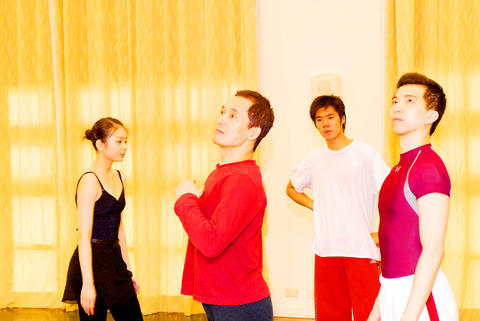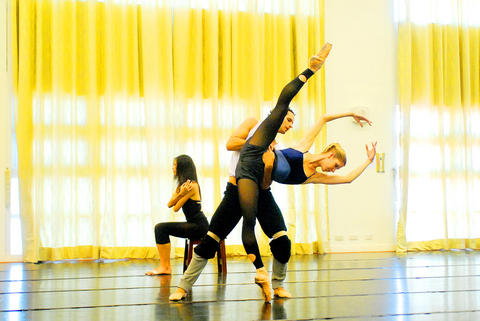Allen Yu (余能盛) feels a close connection with Peter Tchaikovsky. The Taiwanese ballet dancer and choreographer says he loves the 19th-century Russian composer's music, which he has frequently used in his own choreography, and he has read lots of biographies of him.
Last year he gave us a glimpse into the tortured composer's life by restaging his 1998 ballet, Tchaikovsky - None But the Lonely Heart for the Water Reflection Dance Ensemble. This year he is expanding on some of the themes raised in that work for When Ballet Meets Tchaikovsky at Taipei's Metropolitan Hall.
He's been hard at work for the past month, using his vacation time from the Opera House in Graz, Austria - where he is the deputy ballet director and choreographer - to put the finishing touches on three new pieces that make up Ballet Meets Tchaikovsky.

PHOTOS: COURTESY OF CHAMBER OF BALLET TAIPEI
Yu is also a man with a mission. He wants to raise the standards of ballet dancers in this country; standards that he says have sadly declined in recent years.
The situation "is even worse than 20 years ago before I went to Europe. Full-length ballets - no one does them here anymore so ballet dancers don't have the experience, the technique," he said. " We need to build up the dancers here, so I am doing my best to help build up the system."
For the dancers who auditioned for him during a brief visit he made in April, that has meant a lot of hard work. He selected 19 dancers and since he came back to Taipei at the beginning of last month, they have all been putting in long days. He said he told them to drop everything else, no outside classes, no other jobs.

"From 9 [am] to 10:30 [am] we have daily class. After that we have rehearsal until 5pm. The movements [in his ballets] are very fast, so you need strong feet and strong technique," he said. "This is how we dance in Europe. But the dancers here aren't used to this."
As he did last year, Yu has brought his soloists from Europe. Philippines-born Ardee Dionisio, who is a soloist with the Graz Opera House, was a standout in last year's production. Daniel Cimpean, a Romanian soloist with the Darmstadt Staatstheater in Germany, danced here several years ago in Yu's production of The Lady of the Camellias. Two new faces are from the National Ballet of Hungary: Bajari Levente is a principal dancer with that company and Pazar Krisztina is a soloist.
Tchaikovsky's music has long been a favorite of ballet masters and choreographers. Yu selected some pieces that will be familiar to ballet audiences, and one that is not. The first piece he used is the Concerto for violin in D, also known as Serenade, which George Balanchine used for his famous work for the New York City Ballet. The second piece is the Piano Concerto No 1 op.23, and the third is Symphony No 4 in F minor op.36, which Yu said gave him the biggest challenge - and headaches.
The three ballets that make up When Ballet Meet Tchiakovsky each tell a separate story, but Yu says that by the end, their connection is clear.
The first is a meditation on spiritual love, of living your life hemmed in by society, "like a bird in a cage," Yu said.
In the second piece, he said, the soloist is "like a bird looking for its way to freedom." In the third, the bird is finally free to fly away from its cage, he said - but not necessarily happier for it.
Yu says he loves Tchaikovsky's music for its combination of romance and sadness and because it provides him "with limitless imagination."
"It provokes me so much that I want to present my inner feelings on stage," he said.

As Taiwan’s second most populous city, Taichung looms large in the electoral map. Taiwanese political commentators describe it — along with neighboring Changhua County — as Taiwan’s “swing states” (搖擺州), which is a curious direct borrowing from American election terminology. In the early post-Martial Law era, Taichung was referred to as a “desert of democracy” because while the Democratic Progressive Party (DPP) was winning elections in the north and south, Taichung remained staunchly loyal to the Chinese Nationalist Party (KMT). That changed over time, but in both Changhua and Taichung, the DPP still suffers from a “one-term curse,” with the

Jan. 26 to Feb. 1 Nearly 90 years after it was last recorded, the Basay language was taught in a classroom for the first time in September last year. Over the following three months, students learned its sounds along with the customs and folktales of the Ketagalan people, who once spoke it across northern Taiwan. Although each Ketagalan settlement had its own language, Basay functioned as a common trade language. By the late 19th century, it had largely fallen out of daily use as speakers shifted to Hoklo (commonly known as Taiwanese), surviving only in fragments remembered by the elderly. In

William Liu (劉家君) moved to Kaohsiung from Nantou to live with his boyfriend Reg Hong (洪嘉佑). “In Nantou, people do not support gay rights at all and never even talk about it. Living here made me optimistic and made me realize how much I can express myself,” Liu tells the Taipei Times. Hong and his friend Cony Hsieh (謝昀希) are both active in several LGBT groups and organizations in Kaohsiung. They were among the people behind the city’s 16th Pride event in November last year, which gathered over 35,000 people. Along with others, they clearly see Kaohsiung as the nexus of LGBT rights.

In the American west, “it is said, water flows upwards towards money,” wrote Marc Reisner in one of the most compelling books on public policy ever written, Cadillac Desert. As Americans failed to overcome the West’s water scarcity with hard work and private capital, the Federal government came to the rescue. As Reisner describes: “the American West quietly became the first and most durable example of the modern welfare state.” In Taiwan, the money toward which water flows upwards is the high tech industry, particularly the chip powerhouse Taiwan Semiconductor Manufacturing Co (TSMC, 台積電). Typically articles on TSMC’s water demand